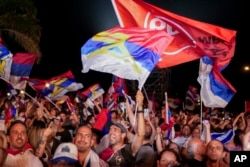The candidate Yamandú Orsi won victory in the second presidential round in Uruguay on Sunday and marked the return to power of the leftist Frente Amplio bloc, which governed the country between 2005 and 2020, under the promise of a “modern” and “renewed” left. .
In his first speech after the election results were known, Orsi went on stage mounted in his campaign center and in the midst of fireworks and shouts he thanked “everyone who carried out this campaign in which we achieved nothing less than victory.”
The standard bearer of the Frente Amplio said that “the country of freedom, equality and also fraternity triumphs once again” and expressed his respect for his rival from the ruling coalition, Álvaro Delgado.
With more than 99% of the votes counted, Orsi reached 49.8% support compared to 45.9% for Delgado in elections that had a participation of close to 90% of voters, according to preliminary data released by the Electoral Court.
The opponent admitted to The Associated Press that the close electoral race gave him butterflies “in his stomach, in his head and everything,” but that he will begin working immediately to shape his government, which will take office on March 1, 2025.
“It’s a strange feeling that I think it takes a while to get over. These are things that one expects, but you are not so sure either,” he said from inside the hotel where he awaited the results of the elections. “Starting tomorrow we will work a lot, there is a lot to do,” he concluded.
After giving his speech to the crowd, Orsi entered the premises of the NH Columbia hotel surrounded by friends, political colleagues and his closest circle, with whom he shared moments of relaxation and celebrations between smiles, hugs and photos.
Orsi’s victory made the small South American nation the latest country to turn its back on a party in power in this historic election year in which voters frustrated by economic malaise punished ruling parties around the world, from United States and Great Britain to South Korea and Japan.
“Let us understand that there is another part of our people that today has a different feeling. These people will also have to help build a better country. We need them too,” Orsi told those attending his speech.
In this framework, he assured that “starting tomorrow” he will begin working to implement a government that will seek national unity.
“I am going to be the president who calls for national dialogue again and again, who builds a more integrated society and country,” he assured. “There is no future if we put a wall on ideas.”
A while earlier, outgoing president Luis Lacalle Pou had congratulated Orsi on his victory, while Delgado acknowledged his defeat by exclaiming in his campaign center that “with sadness, but without a guilt complex, we can congratulate the winner.”
“Today is the victory of the people’s militancy, there are many people who remain below the poverty line and we must invest in health, in social policies, in education. The people deserve it,” teacher Carina Rodríguez told AP.
Delgado, for his part, followed the count from the National Party headquarters in the Uruguayan capital, where silence reigned after the first approaches from four private pollsters.
“Today the people, the Uruguayans, defined who is going to (occupy) the presidency of the republic and I want to send from here… a big hug and greeting to Yamandú Orsi and the Frente Amplio,” said Delgado. “With sadness, but without complexes, I come to congratulate whoever won.”
Reactions to elections in Uruguay
The governments of Brazil, Argentina, Chile and Mexico congratulated Orsi shortly after the official results were released.
“I want to congratulate the Uruguayan people for the holding of democratic and peaceful elections and, especially, the elected president @OrsiYamandu, the Frente Amplio and my friend Pepe Mujica for the victory in today’s contest,” said Brazilian President Luiz Inácio Lula da Silva, on his social network account X.
For its part, the Argentine government of libertarian President Javier Milei congratulated Orsi in a Foreign Ministry publication in X, where he expressed his “commitment to working together with Uruguay to strengthen the shared agenda and the well-being of both countries.”
Some 2.7 million Uruguayans were called to vote in these elections marked by the moderation of the proposals and the tranquility of Uruguayan politics, considered one of the most stable and consolidated democracies in Latin America.
In the first round, held on October 27, Orsi’s Frente Amplio had achieved 44% of the votes compared to the 26.8% obtained by Delgado.
According to the Electoral Court, the day “passed calmly and without major incidents.”
Orsi, 57 years old and heir to the historic José “Pepe” Mujica, trusted in the strength of the Frente Amplio to return power to the left after five years of absence. Delgado, for his part, appealed to Lacalle Pou’s good image to convince voters about the permanence of the administration. The candidate was secretary of the presidency.
With 20 years of political experience, Orsi emphasized his promise to govern with a renewed left, focused on income redistribution to boost economic growth. Likewise, he proposed incentives to revitalize the country’s essential activities such as agriculture, industry, tourism and small businesses, in addition to having adopted a more market-friendly discourse.
“He is my candidate, not only for me but also for my children, who in the future will have better conditions, both in work, health, and salaries,” said nurse Yeny Varone, who took advantage of her break at the hospital. to register your vote.
Delgado, a 55-year-old veterinarian with a long history in the National Party, tried to catapult his closeness with the outgoing president and insisted on being the face of “continuity.” He defended greater economic openness in the country and, like his rival, advocated boosting growth after the slowdown experienced by the COVID-19 pandemic and a historic drought, but through reforms to achieve a more “efficient” State.
Unlike previous years, the campaign was marked by unusual apathy from the electorate. For the final stage of the race, both contenders had heavy support. Both Mujica and Lacalle Pou played a leading role in favor of their respective political godsons.
Mujica, 89 years old and recovering from esophageal cancer, praised the solidity of the electoral process in Uruguay after voting and stressed the importance of preserving it for future generations.
“Uruguay is a small country but it has earned recognition for being stable, for having a citizenry that respects institutional formalities. “It is no small thing in our poor and battered Latin America,” he told reporters. “Young people be aware of that. It took a lot to learn and generate that.”
[Con información de The Associated Press y Reuters]
Connect with the Voice of America! Subscribe to our channels YouTube, WhatsApp and to newsletter. Turn on notifications and follow us on Facebook, x and instagram.















Add Comment